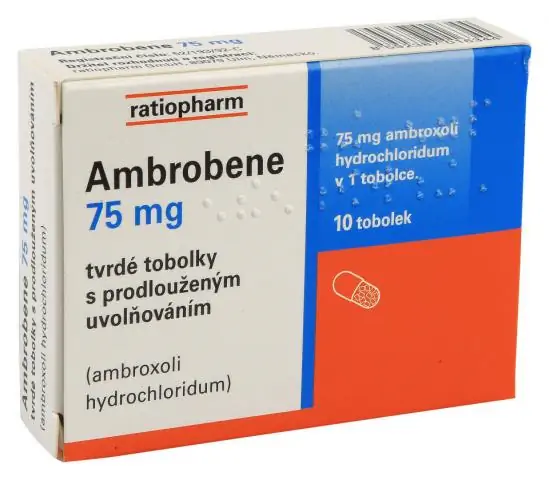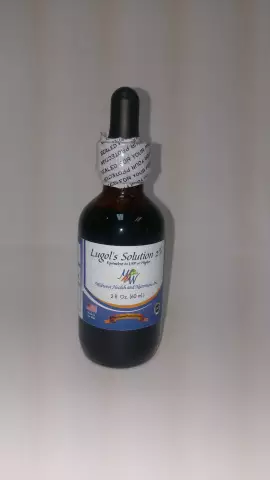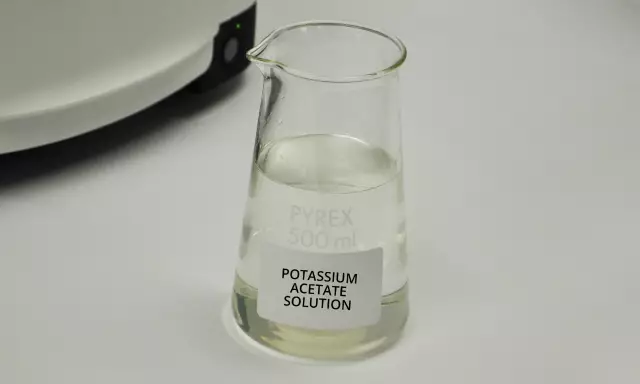- Author Rachel Wainwright wainwright@abchealthonline.com.
- Public 2023-12-15 07:39.
- Last modified 2025-11-02 20:14.
Dextrose
Dextrose: instructions for use and reviews
- 1. Release form and composition
- 2. Pharmacological properties
- 3. Indications for use
- 4. Contraindications
- 5. Method of application and dosage
- 6. Side effects
- 7. Overdose
- 8. Special instructions
- 9. Application during pregnancy and lactation
- 10. Use in childhood
- 11. In case of impaired renal function
- 12. Drug interactions
- 13. Analogs
- 14. Terms and conditions of storage
- 15. Terms of dispensing from pharmacies
- 16. Reviews
- 17. Price in pharmacies
Latin name: Dextrose
ATX code: B05BA03
Active ingredient: Dextrose (Dextrose)
Manufacturer: ABOLmed (Russia)
Description and photo update: 2019-12-08

Dextrose is a means of carbohydrate nutrition.
Release form and composition
- Isotonic solution for infusion of Dextrose 5%: transparent, colorless (100 ml in bottles or vials, 1 bottle in a cardboard box);
- Dextrose 10% hypertonic solution for infusion: transparent, colorless (100 ml in bottles or vials, in a cardboard box 1 bottle).
Active ingredient: dextrose, in 100 ml of solution - 5 or 10 g.
Excipients: hydrochloric acid solution, water for injection.
Pharmacological properties
The drug has metabolic and detoxification effects.
Pharmacodynamics
The drug is an isotonic solution of dextrose, which is converted in the body into the form of glucose-6-phosphate. The substance is involved in various metabolic processes in the body, accelerates the course of redox reactions, improves the liver's ability to fight toxins. The use of the solution increases the osmotic pressure of urine and blood. Also, dextrose increases myocardial contractility, increases diuresis and has a volemic, vasodilating and detoxifying effect.
Pharmacokinetics
The absorption rate of dextrose is quite high, and in the liver it is completely metabolized. The substance is not eliminated (its detection in urine is considered a sign of pathology).
Indications for use
- Lack of carbohydrate nutrition;
- Hypoglycemia;
- Toxic infection;
- Intoxication;
- Dehydration (due to diarrhea, vomiting, in the postoperative period);
- Intoxication in liver diseases (hepatitis, atrophy and liver dystrophy, including liver failure);
- Collapse;
- Hemorrhagic diathesis;
- Shock.
Dextrose is also used for the preparation of solutions of drugs for intravenous administration, is used as a component of various anti-shock and blood-substituting fluids.
Contraindications
Absolute:
- Pulmonary edema;
- Hyperhydration;
- Hyperglycemia;
- Hyperosmolar coma;
- Hyperlactacidemia;
- Cerebral edema;
- Acute left ventricular failure;
- Postoperative glucose utilization disorders;
- Hypersensitivity to the drug.
Relative:
- Hyponatremia;
- Decompensated heart failure;
- Diabetes;
- Chronic renal failure (oliguria, anuria).
Instructions for use of Dextrose: method and dosage
According to the instructions, Dextrose is intended for intravenous administration, drip or jet.
A 5% solution is injected drip at a rate of no more than 7 ml / minute (400 ml per hour) in a daily dose for adults up to 2000 ml; 10% solution - at a rate of no more than 3 ml / minute in a daily dose for adults up to 1000 ml.
10-50 ml of 10% solution is prescribed in a jet.
When prescribing parenteral nutrition to adult patients with normal metabolism, the maximum permissible daily dose of Dextrose is no more than 4-6 g / kg (i.e. approximately 250-450 g / day), the drug is administered at a rate of 0.25-0.5 g / kg / hour. If the metabolic rate decreases, the dose is reduced to 200-300 g and administered at a rate of 0.125-0.25 g / kg / hour. The daily volume of the injected liquid should be 30-40 ml / kg.
For children, Dextrose is administered as parenteral nutrition (along with fats and amino acids): on the first day - 6 g / kg / day, then - up to 15 g / kg / day. When calculating the dose of the drug with the introduction of 5% and 10% solutions, it is necessary to take into account the permissible daily volume of injected fluid: children weighing 2-10 kg - 100-165 ml / kg, children weighing 10-40 kg - 45-100 ml / kg … The maximum permissible injection rate is 0.75 g / kg / hour.
Side effects
- Fever;
- Violation of water and electrolyte balance;
- Hypervolemia;
- Hyperglycemia;
- Acute left ventricular failure;
- Local reactions: thrombophlebitis, infection.
Overdose
Overdose symptoms include violations of water and electrolyte balance, glucosuria, hyperglycemia. In this case, it is necessary to stop the administration of the glucose solution and replace it with insulin. Symptomatic therapy is also effective.
special instructions
Patients with diabetes mellitus should be administered dextrose under the control of its content in urine and blood.
For good absorption of dextrose, administered in large doses, insulin can be prescribed at the same time: 1 IU per 4-5 g of dextrose.
Application during pregnancy and lactation
During pregnancy and lactation, it is allowed to use, according to indications, 5% and 10% Dextrose solutions for infusion.
Pediatric use
The use of the drug in children is possible with strict adherence to the dosage regimen.
With impaired renal function
The drug is used with caution in chronic renal failure (oliguria and anuria).
Drug interactions
In cases where Dextrose is combined with other drugs, it is necessary to visually monitor their pharmaceutical compatibility.
Analogs
Dextrose analogs are: Dextrose-Vial, Glucose, Glucose-Eskom, Glucose Bufus, Glucose-Vial.
Terms and conditions of storage
Store at a temperature of 5-20 ºС, protected from light, dry, out of reach of children.
The shelf life is 3 years.
Terms of dispensing from pharmacies
Dispensed by prescription.
Reviews about Dextrose
Many patients believe that this substance, which enters the body with energy drinks and other products, is quite harmful and leads to the development of addiction. However, the reviews of Dextrose from specialists indicate that this natural compound of organic origin is a universal source of energy in the body. The drug is used to provide additional carbohydrate nutrition, as well as in trauma, surgical and resuscitation practice.
Price for Dextrose in pharmacies
At the moment, the price of Dextrose is unknown, since the drug is not available for sale, but a number of its analogues can be purchased.

Anna Kozlova Medical journalist About the author
Education: Rostov State Medical University, specialty "General Medicine".
Information about the drug is generalized, provided for informational purposes only and does not replace the official instructions. Self-medication is hazardous to health!






